|
|
|
Sort Order |
|
|
|
Items / Page
|
|
|
|
|
|
|
| Srl | Item |
| 1 |
ID:
149369
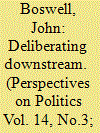

|
|
|
|
|
| Summary/Abstract |
Key theorists and scholars of democracy have focused on understanding and enhancing the institutions and practices that shape decision-making. Indeed, the most influential contemporary normative account—the deliberative version—though increasingly adapted to the complex realities of contemporary politics, retains a tight focus on the conditions of legitimate will formation. This remains the core underpinning of the normative impetus for innovation and reform in contemporary democratic politics. Yet missing from even the adapted deliberative account is detailed consideration of what happens after will formation. I turn here to the policy and administration literature to show how the inescapably attritional and opaque policy process can magnify asymmetries that theorists and scholars of contemporary democracy, chief among them deliberative democrats, ought to be much better attuned to. I argue that in failing to consider these problems adequately, contemporary democratic thinkers, scholars, and reformers risk lending legitimacy to institutions and practices that might sustain the very biases they are mobilized against. As such, I identify institutional innovations and governing practices that can embed aspects of democratic deliberation “downstream” in the policy process in order to counter distortions and rebalance asymmetries. I conclude by calling for theorists, researchers, and reformers to explore the value of these institutions and practices, and to expand the repertoire of governing mechanisms available to counter the distortions that occur through the policy process.
|
|
|
|
|
|
|
|
|
|
|
|
|
|
|
|
| 2 |
ID:
149376


|
|
|
| 3 |
ID:
149365


|
|
|
|
|
| Summary/Abstract |
Why hasn’t the marked increase in women in politics over the last half century led to the expected results of increased gender equality and more democracy? In order to propose a new answer to this question, which is central for both theoretical and empirical feminist political science, I look at the case of Putin’s Russia as one of the authoritarian-leaning regimes that have promoted women into politics while simultaneously becoming more misogynist. Building on feminist institutionalism and the study of Russia’s regime dynamics, both of which are extending the study of informal institutions, I claim that women are being fast-tracked into politics informally, not just formally such as by party or legislative quotas. Yet these women are then boxed in by informal rules and by parallel institutions and posts, with virtually no opportunities to advocate for women’s interests. Putin’s regime has promoted women to be “stand ins” during times of crisis or change, “loyalists” and “showgirls” when the regime needs to showcase elections and representation, and “cleaners” when the appearance of corruption threatens the regime. Even demonstrations of ultimate loyalty have not protected those women who once advocated for feminist policies. This exercise in concept building suggests a framework for thinking about the importance and operation of informal institutions, sustained by gendered and homophobic rules, as a bulwark of male dominance that undermines women’s representation. There are also important policy implications, as advocates have been pushing for more women in politics to address a variety of ills that, my analysis suggests, will not be solved by numbers alone.
|
|
|
|
|
|
|
|
|
|
|
|
|
|
|
|
| 4 |
ID:
149375


|
|
|
| 5 |
ID:
149374


|
|
|
| 6 |
ID:
149367
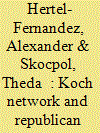

|
|
|
|
|
| Summary/Abstract |
Presidential election years attract attention to the rhetoric, personalities, and agendas of contending White House aspirants, but these headlines do not reflect the ongoing political shifts that will confront whoever moves into the White House in 2017. Earthquakes and erosions have remade the U.S. political terrain, reconfiguring the ground on which politicians and social groups must maneuver, and it is important to make sure that narrow and short-term analyses do not blind us to this shifting terrain. We draw from research on changes since 2000 in the organizational universes surrounding the Republican and Democratic parties to highlight a major emergent force in U.S. politics: the recently expanded “Koch network” that coordinates big money funders, idea producers, issue advocates, and innovative constituency-building efforts in an ongoing effort to pull the Republican Party and agendas of U.S. politics sharply to the right. We review the major components and evolution of the Koch network and explore how it has reshaped American politics and policy agendas, focusing especially on implications for right-tilted partisan polarization and rising economic inequality.
|
|
|
|
|
|
|
|
|
|
|
|
|
|
|
|
| 7 |
ID:
149366


|
|
|
|
|
| Summary/Abstract |
We argue that widely accepted elitist and “clientelist” models of immigration policy in the United States unduly minimize popular pressure on policy-making. These models portray majority opinion in ways that fail to recognize divergence between the public’s abstract goals for immigration policy and its support for the concrete policy changes needed to achieve them. As a result, they obscure many important instances in which immigration policy accords with public preferences despite counter-pressure from elites and organized lobbies. We demonstrate this point by identifying and explaining gaps between generalized attitudes and beliefs about specific policies in the domains of both legal and illegal immigration, showing that status quo legal admissions policies are not starkly at odds with majority preferences and that, contrary to interpretations of most commercial polling on the topic, majorities reject specific aspects of legalization programs that organized lobbies insist on as components of a “grand bargain” to overhaul an immigration system widely viewed as “broken.” Appreciating the nuance in mass opinion toward immigration policy helps explain policy stagnation that confounds elitist models and suggests that forging ahead with immigration reform will require persuading the public and not only successful bargaining among elites and interest groups.
|
|
|
|
|
|
|
|
|
|
|
|
|
|
|
|
| 8 |
ID:
149379


|
|
|
| 9 |
ID:
149368


|
|
|
|
|
| Summary/Abstract |
Why do petitions flourish when they are often denied if not ignored by the sovereigns who receive them? When activists seek to build political organizations in network-rich but information-poor environments, petitioning as institutional technology facilitates recruitment. A petition’s signatory list identifies and locates individuals sympathetic to its prayer and expresses to other citizens who and how many agree with the prayer. Three historical moments—the explosion of antislavery petitioning in the antebellum United States, the emergence of Protestantism in sixteenth-century France, and England’s suppression of petitioning after the Restoration Settlement of 1660—provide vivid demonstrations of the theory. A recruitment-based theory implies that petition drives mobilize as much as they express, that well-established groups and parties petition less frequently, and that the most important readers of a petition are those asked to sign it. The petition’s recruitment function complements, but also transforms, its function of messaging the sovereign. Contemporary digital petitioning both routinizes and takes its force from the petition’s embedded recruitment technology.
|
|
|
|
|
|
|
|
|
|
|
|
|
|
|
|
| 10 |
ID:
149378


|
|
|
| 11 |
ID:
149373
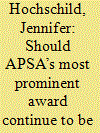

|
|
|
| 12 |
ID:
149364


|
|
|
|
|
| Summary/Abstract |
Hillary Clinton is arguably the most prominent woman in American politics today. Past research suggests female politicians conform to masculine communication styles in an attempt to evade the “double bind.” Clinton’s long and varied career thus provides an important and useful case study for investigating how female politicians present themselves strategically. Drawing on research in political psychology, political communication, social psychology, and linguistics I examine whether Clinton talked “like a man” as she navigated a path toward political leadership by conducting a quantitative textual analysis of 567 interview transcripts and candidate debates between 1992–2013. Results on Clinton’s linguistic style suggest her language grew increasingly masculine over time, as her involvement and power in politics expanded. I also consider Clinton’s language in the context of her 2007–2008 presidential campaign. In 2007, Clinton’s linguistic style was consistently masculine, supporting widespread accounts of Clinton’s campaign strategy. Beginning in late 2007, however, Clinton’s language became more feminine, reflecting a shift in the self-presentational strategies advised by her campaign staff. Throughout the 2008 campaign period, Clinton’s language fluctuated dramatically from one interview to the next, reflecting a candidate—and campaign—in crisis. This study reveals hidden insight into the strategies Clinton used as she navigated through the labyrinth toward leadership. Changes in Clinton’s linguistic style reflect the performance of gendered roles, expectations of political leaders, and the masculine norms of behavior that permeate political institutions.
|
|
|
|
|
|
|
|
|
|
|
|
|
|
|
|
| 13 |
ID:
149377


|
|
|
| 14 |
ID:
149371


|
|
|
|
|
| Summary/Abstract |
This paper considers the challenges and opportunities of conducting a thick, qualitative study of a twenty-first century presidential ground campaign. Our goals in the study were to describe phenomena that are not commonly examined in most studies of field campaigns, namely (a) the purportedly transformative impact of the campaign on both individuals and collective contexts, (b) the holistic interaction of different strategic elements of the campaign, and (c) the processes the campaign used to develop citizen leadership to scale the campaign. We also consider the limitations of our approach, the reception of a book intended for both academic and practitioner audiences, and underexploited research agendas in the study of campaigns.
|
|
|
|
|
|
|
|
|
|
|
|
|
|
|
|
| 15 |
ID:
149370
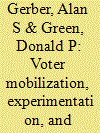

|
|
|
|
|
| Summary/Abstract |
Field experiments on voter mobilization enable researchers to test theoretical propositions while at the same time addressing practical questions that confront campaigns. This confluence of interests has led to increasing collaboration between researchers and campaign organizations, which in turn has produced a rapid accumulation of experiments on voting. This new evidence base makes possible translational works such as Get Out the Vote: How to Increase Voter Turnout that synthesize the burgeoning research literature and convey its conclusions to campaign practitioners. However, as political groups develop their own in-house capacity to conduct experiments whose results remain proprietary and may be reported selectively, the accumulation of an unbiased, public knowledge base is threatened. We discuss these challenges and the ways in which research that focuses on practical concerns may nonetheless speak to enduring theoretical questions.
|
|
|
|
|
|
|
|
|
|
|
|
|
|
|
|
| 16 |
ID:
149372
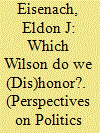

|
|
|
|
|
| Summary/Abstract |
Woodrow Wilson is the only American political scientist to have served as President of the United States. In the time between his political science Ph.D. (from Johns Hopkins, in 1886) and his tenure as president (1913–21), he also served as president of Princeton University (1902–10) and president of the American Political Science Association (1909–10). Wilson is one of the most revered figures in American political thought and in American political science. The Woodrow Wilson Award is perhaps APSA’s most distinguished award, given annually for the best book on government, politics, or international affairs published in the previous year, and sponsored by the Woodrow Wilson Foundation at Princeton University.
|
|
|
|
|
|
|
|
|
|
|
|
|
|
|
|
|
|
|
|
|